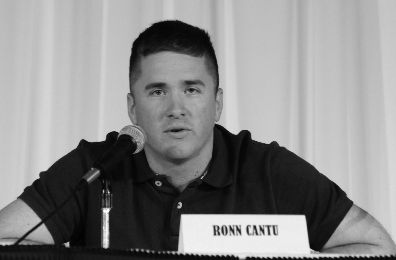Winter Soldier (31 page)
Authors: Iraq Veterans Against the War,Aaron Glantz
Tags: #QuarkXPress, #ebook, #epub

Duty, Honor, Country…Colonel Ted Westhusing…
Luis Carlos Montalván
Former Captain, U.S. Army

After more than five years of war, most American soldiers know the same things about Iraq that the American people do: that the invasion of Iraq was based on lies, that there was no link between Saddam Hussein and the 9/11 attacks, and that Iraq had no weapons of mass destruction. Those facts—coupled with the grim, daily reality of life in the war zone—have turned a majority of American soldiers against the occupation.
In February 2006 pollster John Zogby conducted a survey of U.S. soldiers stationed in Iraq. Seventy-two percent said that U.S. troops should be pulled out within one year. Of those, 29 percent said they should be withdrawn “immediately.”1 In other words, if the Bush administration had listened to its own troops instead of implementing the surge, the occupation would already be over.
Servicemembers are coping with this in a variety of ways. Tens of thousands of soldiers and marines have found ways, both legal and illegal, to avoid personally participating in the U.S. occupation of Iraq. The Defense Department reports that 5,361 active-duty servicemembers deserted the U.S. Armed Forces in 2006; nearly thirty-seven thousand defected in the first five years after 9/11. Thousands more have quietly gone AWOL after returning from their first deployment. Three hundred and twenty-five army soldiers have applied to be recognized as conscientious objectors, soldiers who no longer believe in war.2 Over two hundred have fled the country and are seeking asylum in Canada.
Soldiers who remain inside the military are also fighting back. More than two thousand active-duty servicemembers have signed an Appeal for Redress to Congress demanding an end to the occupation. “As a patriotic American proud to serve the nation in uniform, I respectfully urge my political leaders in Congress to support the prompt withdrawal of all American military forces and bases from Iraq,” the petition reads. “Staying in Iraq will not work and is not worth the price. It is time for U.S. troops to come home.”3 The efforts have been endorsed by numerous members of Congress, including civil rights icon John Lewis (D-GA), who released a statement conveying his “deep respect for these men and women and uniform who have taken this courageous and patriotic step…. They have exercised their constitutional right to free speech, and they have questioned an unjust war.”4
Military blogs have also flourished, both in the United States and in Iraq. Over time, many have developed large followings. Indeed, they have been so successful that in April 2007 the Pentagon was forced to clamp down, requiring all servicemembers to consult a superior “prior to publishing” anything—from “web log (blog) postings” to comments on internet message boards. Failure to do so, the regulations add, could result in a court-martial or “administrative, disciplinary, contractual, or criminal action.”5 As the veterans’ testimony at Winter Soldier shows, however, these rules have been impossible to enforce. With limited exceptions, members of the U.S. Armed Forces do not give up their rights to free speech and free expression just because they put on a uniform.
Members of the U.S. military have also begun organizing for better health care and medical benefits and for an end to the U.S. occupation of Iraq. IVAW now has active chapters on bases across America and all over the world—including a growing number of soldiers and marines stationed in Iraq. These efforts are still in their early stages, but as the first wave of servicemembers speaks out, others realize they are not alone and the movement spreads. Five years into this terrible war, the Pentagon’s very ability to fight it is becoming diminished.

Private, United States Army, MOS
Deployments: August 2005–July 2006 Abu Ghraib
Hometown: Atlanta, Georgia
Age at Winter Soldier: 21 years old
Let me begin by saying to my sisters and brothers in Iraq and Afghanistan: You are not alone in your opposition to these illegal occupations. We must struggle together on every military base and in every combat zone and with every veteran to end the occupation. Let me be clear. We have the power to bring the troops home when soldiers throw down their weapons and refuse to fight.
When I joined the military in November 2004, the army and marines were engaged in the second invasion of Fallujah. During my tour in 2006, I was ambushed many times and struck by numerous roadside bombs as my unit fought the insurgency in the farmlands west of Baghdad. This experience radicalized me.
When I returned to Fort Drum in upstate New York I bought a film called The Ground Truth and watched it with Sergeant Matt Hrutkay, with whom I served in Iraq. The film inspired Matt to join Iraq Veterans Against the War (IVAW) when he got out of the army. In March of 2007 Matt, along with Vermont veterans, the local Campus Anti-War Network, and members of the International Socialist Organization, put together an event at the Different Drummer Cafe in Watertown, New York. The Different Drummer is the first off-post coffeehouse for GIs since the Vietnam War. It was started by Tod Ensign of Citizen Soldier.
At Different Drummer I met others who articulated an opposition to the war that was in line with my experiences. Three other active-duty soldiers signed up for IVAW, and it gave me a framework for how to organize to end the war. After my rotation at the Joint Readiness Training Center at Fort Polk, Louisiana, I organized a second event at the Different Drummer with former antiwar veterans and civilian activists. We signed up more veterans and built support for Eugene Cherry, a soldier at Fort Drum who went AWOL after returning from Iraq because he was not receiving proper medical treatment for Post-Traumatic Stress Disorder.
As a result of our activism, Eugene avoided a court-martial and was discharged without jail time. It was our first victory at Fort Drum and it built our confidence. If we organized the grass roots to support our struggle, then we could win. Eugene’s case also sent a message to the soldiers of Fort Drum that they were not alone.
I met Eli Wright, a combat veteran and medic who had transferred to Fort Drum after serving at Walter Reed and in Iraq. He found the Different Drummer Cafe while walking through Watertown. He had been a member of IVAW for almost two years before coming to Fort Drum. We supported each other in myriad initiatives, all of which were 100 percent legal for active-duty soldiers.
During that time IVAW organized a bus full of veterans to come to Fort Drum. They held barbeques and other social activities and again showed the troops on post that they were not alone. We signed up eight new members and had ninety people from the community come to show their support. This kind of turnout for an event organized by IVAW was a success beyond our wildest imagination.
We began building a model: showing that GI organizing could not be successful without the civilian antiwar movement. In order for soldiers to publicly oppose the occupation, they must have a movement behind them. That is the most important component to the work at Fort Drum. Through our networking with ally organizations we were able to raise money, host events, and make contacts on the base. We worked with every organization that supported our strategy of ending the war.
In the summer of 2007, other IVAW members and I organized a march and rally to publicly introduce our chapter to active-duty soldiers and help the community support war resisters. On September 29, 2007, the march brought over 2,500 people from upstate New York to Fort Drum, and more active-duty GIs became members of IVAW. Within a matter of months, our chapter went from three members to almost thirty.
Because of the high turnover rate within the military, we had to constantly train new leaders in the chapter. As soldiers left the military or changed duty stations, they took their experiences from Fort Drum and helped build other chapters around the country. Building a support network around the base of experienced organizers was the key to the survival of the chapter because outside organizations helped us develop leadership in our new IVAW members.
As I left the military in early 2008, I was confident in the Fort Drum chapter because we had been successful in building a civilian support network, providing outside mental health care for soldiers, and built leadership in the chapter that had a focus on base building and growing connections with outside groups in order to inspire soldiers to fight for the end of the occupation in Iraq. Fort Drum was the first active-duty chapter in IVAW and it can be a positive example for the movement.
The most important lesson I learned was that we didn’t need to water down our beliefs, nor did we need to shock people into action. GIs are ready for politics. Their experiences are moving them to want a better world, and our ability to articulate our principled opposition to the Iraq war is what gives us the power to end it.

Specialist, United States Army, Cavalry Scout, 1st Infantry Division, 3rd Brigade
Deployments: February 2004–February 2005, Baqouba
Hometown: Grand Junction, Colorado
Age at Winter Soldier: 32 years old
I served as a cavalry scout in the 1st Infantry Division and I went on to go to the Target Interdiction Course in Stetten, Germany, and became a sniper. I served as a sniper for a year in Iraq between February ’04 and February ’05 around Baquba in the Sunni Triangle.
During our deployment, we started one of the first antiwar MilBlogs, Fight to Survive, and we were involved in a variety of GI resistance but it didn’t entail breaking army regulations. That allowed us to receive an honorable discharge. There are ways to resist this war within army regulations.
One of the most important things about our U.S. military is you’re a citizen soldier. You retain your rights as a citizen. You’re able to use those rights and you should since you’re the one sacrificing to protect them. It’ll be a shame if the use of the First Amendment becomes unpatriotic.
I joined Iraq Veterans Against the War (IVAW) when they first started out. Myself and the other soldiers I deployed with were resisting before we knew there was an IVAW, before Sir! No Sir! or GI Revolt came out. When IVAW formed in the summer of 2004, I was contacted by Kelly Dougherty, Camilo Mejía, and some of the other founding members, and as a result, I became the first active-duty member of Iraq Veterans Against the War.
Today we’re talking about the future of GI resistance, and you can’t help but try to predict the future by looking at the past. I think this Winter Soldier is so incredible. We’re doing this far earlier than the Vietnam vets. Thanks to their mentorship, we put this together five years after our invasion and occupation of Iraq. The Vietnam veterans conducted a Winter Soldier in 1971 and the Vietnam War started in 1959; that’s more than ten years after the engagement started, and three years after the 1968 Tet Offensive. We had over four hundred thousand American troops deployed in Vietnam at the time. Over fourteen thousand soldiers had been killed in action. I feel that we’re ahead of the game. We might be less in numbers and we might have less of a political voice, and America is very different now, but if we can start this resistance early, we can end this war before there is a Tet Offensive in Iraq.
